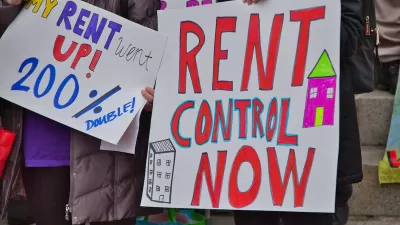A program that has supported the construction of thousands of affordable units could lapse if state lawmakers don’t approve an extension or revision.

A New York program designed to increase housing affordability could end “amid fierce opposition from lefties and ineffective pushback from City Hall’s dysfunctional statehouse operation, which has failed to reach out to key lawmakers.” As reported by Nolan Hicks and Zach Williams in the New York Post, “The 421-a program, set to expire in June, provides developers with city property tax abatements worth an estimated $1.8 billion in exchange for agreeing to limit and regulate the rents on a portion of the apartments in the new buildings they erect.”
According to former commissioner and deputy mayor Vicki Been, the program helped create around 8,000 affordable housing units in the last ten years. “All told, 421-a either partially or completely funded 4,030 of the 4,279 newly rent-stabilized apartments in New York City in 2020, figures from the Rent Guidelines Board show.” Been notes that the program has also been successful in promoting construction of affordable apartments in wealthier parts of the city, unlike units built under other programs that offer direct subsidies.
“But progressives have long had the program in their sights, angered over its very structure and provisions that allow developers to set rents for some of the apartments for households with incomes that exceed the city average by as much as 30%.” City Comptroller Brad Lander says “state lawmakers should let the program expire and embark on an overhaul of the property tax system that treats rentals more fairly, attempts at which have repeatedly failed.”
FULL STORY: Key affordable housing program may lapse due to 'politics' as NYC rents soar

Maui's Vacation Rental Debate Turns Ugly
Verbal attacks, misinformation campaigns and fistfights plague a high-stakes debate to convert thousands of vacation rentals into long-term housing.

Planetizen Federal Action Tracker
A weekly monitor of how Trump’s orders and actions are impacting planners and planning in America.

In Urban Planning, AI Prompting Could be the New Design Thinking
Creativity has long been key to great urban design. What if we see AI as our new creative partner?

Florida Seniors Face Rising Homelessness Risk
High housing costs are pushing more seniors, many of them on a fixed income, into homelessness.

Massachusetts Budget Helps Close MBTA Budget Gap
The budget signed by Gov. Maura Healey includes $470 million in MBTA funding for the next fiscal year.

Milwaukee Launches Vision Zero Plan
Seven years after the city signed its Complete Streets Policy, the city is doubling down on its efforts to eliminate traffic deaths.
Urban Design for Planners 1: Software Tools
This six-course series explores essential urban design concepts using open source software and equips planners with the tools they need to participate fully in the urban design process.
Planning for Universal Design
Learn the tools for implementing Universal Design in planning regulations.
Gallatin County Department of Planning & Community Development
Heyer Gruel & Associates PA
JM Goldson LLC
City of Camden Redevelopment Agency
City of Astoria
Transportation Research & Education Center (TREC) at Portland State University
Jefferson Parish Government
Camden Redevelopment Agency
City of Claremont





























